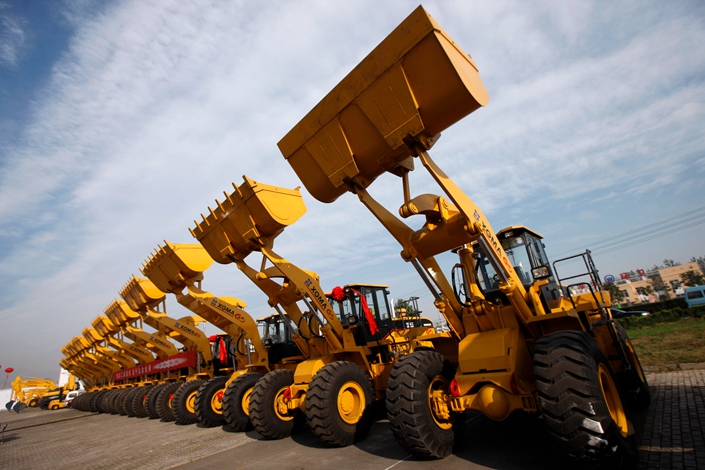Demand for Digging Equipment Offers Fresh Hope for Growth

(Beijing) — China sales of dirt-moving machines called excavators skyrocketed in February against the backdrop of government efforts to bolster economic growth by increasing infrastructure spending.
Sales of excavators had been falling for years before reversing last year and reaching a 15-year high of 14,530 units in February, up nearly 300% from the same period last year, according to the China Construction Machinery Association.
Sany Heavy Industry Co. Ltd., the nation’s largest heavy-equipment maker, said it sold more than 3,600 excavators last month — more than three times the number it sold in February 2016.
Other major excavator manufacturers also saw their sales jump last month. XCMG Construction Machinery Co. Ltd.’s sales grew by a factor of six, to 1,405, according to a Zhongtai Securities report, while Guangxi Liugong Machinery Co. Ltd. reported a threefold increase in excavator sales.
The business climate started improving last year, as a recovering housing market pushed sales of these earth-moving machines, which are used for a variety of building projects. About 70,320 excavators were sold in 2016, up 16.2% from a year earlier. Sales had been sluggish since 2012.
Thanks to government infrastructure projects, excavator sales momentum has continued since December amid efforts by government regulators to cool the nation’s housing market and, thus, new housing construction. Those steps included rules that limited home purchases and tightened lending to developers and home buyers.
“Right now, the most important contributor to the growth in excavator sales is a pickup in infrastructure projects and resource-related activities, which includes large-scale construction, mineral exploration and building infrastructure projects in the countryside,” Sany said in a statement on its website last week. “The impact from the real estate sector is declining.”
The recovery in excavators sales might indicate that China’s economy is improving as “the excavator industry highly coincides with the economic cycle,” said Shen Jianguang, chief economist at Mizuho Securities Asia Ltd.
“An excavator is an essential tool for civil engineering, and civil engineering is the prerequisite for all infrastructure projects,” a Sany employee said.
Demand for other types of heavy equipment, such as concrete mixers and concrete pumps, are expected to rise this year as well.
The government’s infrastructure push is linked to a pickup in public-private partnership (PPP) programs. The government has been tapping private capital through PPP agreements to fund infrastructure programs rather than further burden the balance sheets of already indebted local governments.
Private investors last year had agreed to support more than 1,300 projects with a combined 2.2 trillion yuan ($319 billion) as of late 2016, Finance Minister Xiao Jie said.
 |
Wang Tao, head of China economic research at the securities firm UBS, said she expects PPP projects with a combined value of up to 4 trillion yuan will get underway this year. Those projects are likely to boost infrastructure project investments by up to 18%, she said.
Excavator manufacturers experienced booming sales for years after the 2008 financial crisis thanks to the Chinese government’s whopping 4 trillion yuan stimulus package that year. By 2011, annual excavator sales had risen to 194,000 — a nine-year high — before declining to 60,500 in 2015, according to Wind, a financial information provider.
Demand for new construction projects has encouraged companies that operate excavators to replace their older machines, which typically last no more than 10 years. Some older machines now in use date to the post-financial crisis period, when infrastructure projects were booming, Zhongtai analyst Wang Huajun said.
Contact reporter Chen Na (nachen@caixin.com)

- 1China Officials Dismiss Tax Hike Rumors After Tech Selloff
- 2Cover Story: How Gutter Oil Became a Prized Fuel for International Airlines
- 3Prominent Chinese Journalist Liu Hu Detained by Police in Chengdu
- 4Maersk Unit Takes Over CK Hutchison Panama Ports After Court Ruling
- 5China Provinces Set Cautious 2026 Growth Targets
- 1Power To The People: Pintec Serves A Booming Consumer Class
- 2Largest hotel group in Europe accepts UnionPay
- 3UnionPay mobile QuickPass debuts in Hong Kong
- 4UnionPay International launches premium catering privilege U Dining Collection
- 5UnionPay International’s U Plan has covered over 1600 stores overseas




